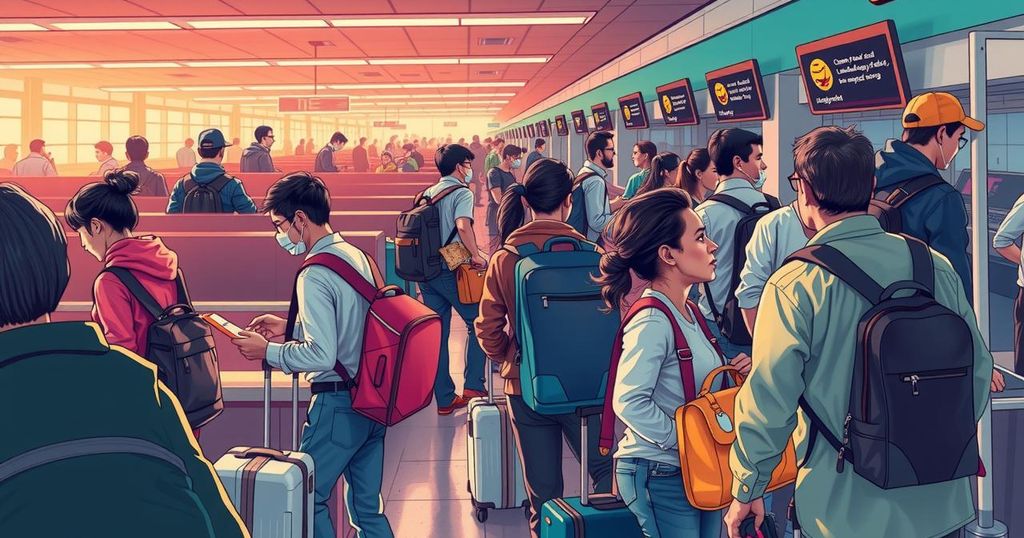America Turns Into Minefield Again as Trump Revives Travel Ban and Restrictions

President Trump’s reinstated travel ban targets travelers from several nations, creating significant confusion and consequences for the U.S. travel industry. Effective Monday, the ban prohibits entry from 13 countries and imposes heightened restrictions on eight others. The move raises concerns about the human, economic, and diplomatic fallout as anxiety grips students, families, and businesses alike. Legal battles are anticipated as advocates mobilize against the controversial policy.
US President Donald Trump has recently reinstituted a sweeping travel ban that has transformed the country into something akin to a travel minefield. The revised ban targets citizens from numerous countries including Cuba, Burma, Turkmenistan, Iran, and Venezuela, reigniting tensions and creating confusion within the travel and tourism sectors. The measure is more extensive than before, raising questions about its implications on international mobility and economic ties.
Set to take effect at 12:01 a.m. on Monday, the new directive prohibits travelers from 13 countries entirely while increasing restrictions for eight others. National security is cited as the core rationalization for the ban, although the move is already causing major disruptions affecting aviation, immigration systems, and global business. The emotional impact on affected families and businesses, particularly those with deep ties to the United States, is also significant.
Among the nations on the no-fly list are Afghanistan, Libya, Iran, and Syria, alongside additional scrutiny placed on citizens from countries like Burundi and Cuba. For many involved—students, tourists, and professionals—this announcement is catastrophic. Major carriers and travel agencies are understandably alarmed, as potential cancellations and rebookings loom large on the horizon.
As local and international airports prepare, echoes of the chaotic 2017 travel ban are palpable. Many airlines are bracing for an influx of urgent rebooking requests and potential legal challenges. Immigration officials are reportedly being briefed on new regulations, and embassies are receiving a flood of inquiries from anxious travelers. The sense of uncertainty is more than just logistical; it is a bitter reminder of past turmoil in travel and immigration processes.
The ramifications for the tourism sector are severe. Countries that may not have seemed like heavy hitters in tourist numbers, like Libya and Haiti, actually contribute significantly to specialized travel niches. Consequently, countless travel agencies, particularly those serving diaspora-heavy cities, might find themselves navigating crisis management for the foreseeable future. Corporate meeting cancellations are also expected to rise, putting pressure on the U.S. as a business destination.
These travel restrictions could have negative diplomatic implications as countries affected may retaliate with their own travel advisories or restrictions on American travelers. As embassies deal with fallout from the travel ban, ongoing international negotiations about security and trade might also suffer significant setbacks. Concerns surround the impact on educational and cultural exchange programs, as the travel ban threatens to disrupt decades of diplomacy through people-to-people connections.
Legal challenges to this newly reinstated proclamation are likely to arise swiftly, with civil rights organizations gearing up for court battles reminiscent of those seen during Trump’s first term. An adverse ruling could send shockwaves through the administration and spark further policy reversals down the line. And with this new political climate more complicated than before, resistance from states and advocacy groups may once again overshadow the administration’s efforts.
Travel booking platforms are also facing immense pressure to adapt quickly. With an immediate need to inform clients and update systems, the task falls heavily on travel advisors to navigate a complicated landscape, shifting gears from simple planning to crisis management. This not only complicates travel logistics but can also invoke emotional distress for those discussing cancellations and alterations.
Ultimately, beneath all the numbers and regulations lies a human story. This travel ban not only disrupts journeys—it creates heart-wrenching dilemmas for families, students, and business leaders. At a time when global connectivity is more paramount than ever, setting up new barriers only adds to a fragile situation globally. The industry now faces a wake-up call as it grapples with new challenges that could redefine travel for years to come.
In conclusion, President Trump’s reinstated travel ban significantly affects international mobility, tourism, and diplomatic relations. With a broader scope than previous restrictions, it could reshape interactions between the U.S. and various countries, hinder vital exchanges, and create profound emotional impacts on individuals impacted by these policies. The next few months will be crucial as the travel and tourism industry adapts to these new challenges, and the legal landscape unfolds around potential challenges to the ban.
Original Source: www.travelandtourworld.com







